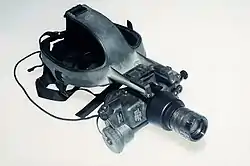| AN/PVS-7 | |
|---|---|
 An early version of the AN/PVS-7B goggle | |
| Type | Passive/Active |
| Place of origin | United States |
| Category | Head-mountable |
| Service history | |
| In service | 1988–present[1] |
| Used by | United States Armed Forces Philippine Army Argentine Army Canadian Forces Australian Army |
| Wars | United States invasion of Panama Persian Gulf War War in Afghanistan Iraq War |
| Production history | |
| Designer | ITT Industries Litton Industries[2] |
| Designed | 1982 |
| Manufacturer | ITT Industries Litton Industries Northrop Grumman L3 Communications Armasight, Inc |
| Variants | AN/PVS-7A, AN/PVS-7B, AN/PVS-7C, AN/PVS-7D |
| Specifications | |
| Weight | 680 grams |
| Dimensions (L×H×W) | 5.8" x 3.1" x 6.1" |
| Resolution (lp/mm) | >64 lp/mm |
| Tube form factor | 18mm |
| Field of vision (°) | 40 degrees |
| Range of detection | 325m (Starlight) |
| Range of recognition | 225m (Starlight) |
| System zoom | 1× |
| Generation | 2 or 3 |
The AN/PVS-7 is a single tube biocular night vision device. Third-generation image intensifiers are able to be installed and are standard for military night vision. Most newer PVS-7 intensifier tubes are auto-gated to prevent image intensifier damage if exposed to intense light. The goggles have a built-in infrared Illuminator for low-light situations. They are waterproof and charged with nitrogen to prevent internal condensation while moving between extreme temperatures.
They were designed to replace the older AN/PVS-5 from the Vietnam War.[3] Though slowly being phased out by the AN/PVS-14, the AN/PVS-7 is still being used by the United States Armed Forces with hundreds of thousands in service.[2]
The designation AN/PVS translates to Army/Navy Portable Visual Search, according to Joint Electronics Type Designation System guidelines.
References
- ↑ Pike, John. "AN/PVS-7 Night Vision Goggle". FAS Military Analysis Network. Archived from the original on 24 September 2021. Retrieved 22 May 2022.
- 1 2 "Night Vision History". Armasight.com. Archived from the original on 2018-07-21. Retrieved 2013-08-17.
- ↑ "A Performance History of AN/PVS-5 and ANVIS Image Intensification Systems in U.S. Army Aviation" (PDF). Usaarl.mil. Archived from the original (PDF) on 2020-11-14. Retrieved 2013-08-17.